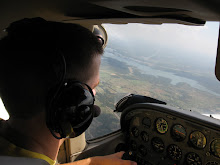"All endings are actually beginnings, we just don't know it at the time." -Mitch Albom
No matter how long a particular journey is, there's always a myriad of emotions when it's finally over. But is there a certain way one should feel? Whatever the manual says, I don't think I followed it properly: there were no victory parades, no celebratory champagne toasts, and not even the obligatory trip to the Chinese buffet. I'm still not sure what happened. Did I really do this? Is it actually over? It still doesn't seem real: I'm still waiting for the FAA to storm my house in the middle of the night William Wallace-style, take all my pilot certificates, then set everything ablaze on their way out. But it really is over. Hard to believe. Look, I hate cliches as much the sandwich artists at Subway hate it when I ask for extra spinach, but it really does feel like yesterday I packed up my house and moved to Texas. And now it's over? I feel many things, but above all else, I am relieved. I'm glad that my sixteen hour study days are over, and happy that the late night sim sessions are through. Grateful that I survived the grueling pace, and thankful I made it my original goal: I'm now a certified flight instructor with 220 hours in the logbook. I scraped and clawed for every single one of those hours, and could have compiled some awfully disgusting statistics about if I'd kept track. I'm excited that I'll now have the freedom to decompose on my parent's couch while not feeling too guilty about not studying.
It took way too long for my body to detox from eating nothing besides sandwiches and noodles. For the first few days I kept reaching instinctively for sandwiches, even while Mom did everything short of strapping me to a chair and pouring pureed steak and chicken down my throat. The good news: I survived without contracting any communicable diseases and while keeping my sanity intact. The bad news: I lost an inordinate amount of weight and successfully convinced my stomach that the food pyramid is nothing but an elaborate hoax. I'm sure I'll develop some form of mutation later in life because of this.
My last checkride was largely uneventful. Back in the single engine Cessna for the last time, I took this one out of the right seat, and played the role of flight instructor. The examiner was cheerful and full of conversation, almost exceedingly kind, like he knew just how hard I'd pushed myself to get to that point. I flew a variety of maneuvers, mostly ones I'd performed before, talking through each as though I were teaching a new student. It was almost easy. On my final approach to Arlington, some 400 feet above ground, a fuel track inadvertantly drove out on the runway, parked itself, and forced me to make an emergency go-around. The odds of this happening had to be something like 227,000 to 1. I mean, my roommate and I had wasted hundreds of hours practicing this exact scenario, only because we both loved throwing unmitigated disasters at one another to see how we'd react. But who, besides terrorists, drives a fuel truck on an active runway? As I jammed the throttle forward and began to climb, I called the control tower to notify them of what was happening, and in a matter of seconds, chaos ensued. Controllers could be heard over the frequency yelling at one another, wondering how such a colossal breakdown in airport security could occur. Phone calls were made, and the words 'FBI' and 'arrests' were audible over the radios. Either way, I was soon out of the traffic pattern, and planning for the return landing. In a matter of moments, I was back on the ground, and I had passed my final checkride. As for the fuel truck guy, I think it's safe to say he didn't pass his checkride.
For the last time, the examiner shook my hand and forked over my temporary certificate. I think even someone as experienced and proficient in the airplane as he is can appreciate just how far I've come in five months. Or maybe he was lamenting the fact that I'd no longer be making trips to the ATM for the express purpose of bolstering his bank account. Did I really give the examiner $3,675? Yes. Hopefully he's enjoying that two week yacthing expedition off the Caribbean islands. You're welcome, sir. I'd prefer to not think about that money.
Thank you for reading this journey, for following along as I struggled first with a new environment and grasping the intricacies of flying an airplane, for growing with me as I flew by myself for the first time, to encouraging me during the instrument phase, for listening as I wondered if I'd ever make it, and for putting up with a ridiculous sandwich count at the end of every posting, all the way to seeing and hearing about the finished product. In a way, you are all pilots too. I may be leaving flight school, but I'll still be blogging, and since I'm writing this retroactively, there's a new journey already happening that I'm anxious to write about. In the meantime, here's a short clip from one of my favorite movies that sums up the last 5 months better than anything else I could have said:


